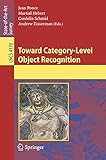Toward Category-Level Object Recognition [electronic resource] / edited by Jean Ponce, Martial Hebert, Cordelia Schmid, Andrew Zisserman.
Contributor(s): Ponce, Jean [editor.] | Hebert, Martial [editor.]
| Hebert, Martial [editor.] | Schmid, Cordelia [editor.]
| Schmid, Cordelia [editor.] | Zisserman, Andrew [editor.]
| Zisserman, Andrew [editor.] | SpringerLink (Online service)
| SpringerLink (Online service) .
.
Material type:  BookSeries: Image Processing, Computer Vision, Pattern Recognition, and Graphics: 4170Publisher: Berlin, Heidelberg : Springer Berlin Heidelberg : Imprint: Springer, 2006Edition: 1st ed. 2006.Description: XI, 620 p. online resource.Content type: text Media type: computer Carrier type: online resourceISBN: 9783540687955.Subject(s): Pattern recognition systems
BookSeries: Image Processing, Computer Vision, Pattern Recognition, and Graphics: 4170Publisher: Berlin, Heidelberg : Springer Berlin Heidelberg : Imprint: Springer, 2006Edition: 1st ed. 2006.Description: XI, 620 p. online resource.Content type: text Media type: computer Carrier type: online resourceISBN: 9783540687955.Subject(s): Pattern recognition systemsObject Recognition in the Geometric Era: A Retrospective -- Dataset Issues in Object Recognition -- Industry and Object Recognition: Applications, Applied Research and Challenges -- Recognition of Specific Objects -- What and Where: 3D Object Recognition with Accurate Pose -- Object Recognition Using Local Affine Frames on Maximally Stable Extremal Regions -- 3D Object Modeling and Recognition from Photographs and Image Sequences -- Video Google: Efficient Visual Search of Videos -- Simultaneous Object Recognition and Segmentation by Image Exploration -- Recognition of Object Categories -- Comparison of Generative and Discriminative Techniques for Object Detection and Classification -- Synergistic Face Detection and Pose Estimation with Energy-Based Models -- Generic Visual Categorization Using Weak Geometry -- Components for Object Detection and Identification -- Cross Modal Disambiguation -- Translating Images to Words for Recognizing Objects in Large Image and Video Collections -- A Semi-supervised Learning Approach to Object Recognition with Spatial Integration of Local Features and Segmentation Cues -- Towards the Optimal Training of Cascades of Boosted Ensembles -- Visual Classification by a Hierarchy of Extended Fragments -- Shared Features for Multiclass Object Detection -- Generative Models for Labeling Multi-object Configurations in Images -- Object Detection and Localization Using Local and Global Features -- The Trace Model for Object Detection and Tracking -- Recognition of Object Categories with Geometric Relations -- A Discriminative Framework for Texture and Object Recognition Using Local Image Features -- A Sparse Object Category Model for Efficient Learning and Complete Recognition -- Object Recognition by Combining Appearance and Geometry -- Shape Matching and Object Recognition -- An Implicit Shape Model for Combined Object Categorization and Segmentation -- Statistical Models of Shape and Texture for Face Recognition -- Joint Recognition and Segmentation -- Image Parsing: Unifying Segmentation, Detection, and Recognition -- Sequential Learning of Layered Models from Video -- An Object Category Specific mrf for Segmentation.
Although research in computer vision for recognizing 3D objects in photographs dates back to the 1960s, progress was relatively slow until the turn of the millennium, and only now do we see the emergence of effective techniques for recognizing object categories with different appearances under large variations in the observation conditions. Tremendous progress has been achieved in the past five years, thanks largely to the integration of new data representations, such as invariant semi-local features, developed in the computer vision community with the effective models of data distribution and classification procedures developed in the statistical machine-learning community. This volume is a post-event proceedings volume and contains selected papers based on presentations given, and vivid discussions held, during two workshops held in Taormina in 2003 and 2004. The main goals of these two workshops were to promote the creation of an international object recognition community, with common datasets and evaluation procedures, to map the state of the art and identify the main open problems and opportunities for synergistic research, and to articulate the industrial and societal needs and opportunities for object recognition research worldwide. The 30 thoroughly revised papers presented are organized in the following topical sections: recognition of specific objects, recognition of object categories, recognition of object categories with geometric relations, and joint recognition and segmentation.


There are no comments for this item.